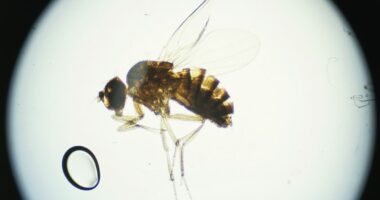Share this @internewscast.com
A new study has found taurine, a substance commonly found in energy drinks, meat and naturally occuring in the human body, is a key fuel source for aggressive blood cancer. The study, conducted by researchers at the University of Rochester, revealed that leukemia cells rely on taurine to grow and spread, but are unable to produce it themselves.
Instead, these cells hijack taurine from their surroundings using specific transporter genes, suggesting that targeting this process could effectively starve the cancer cells and halt their progression. The findings, published in the journal Nature, also raise concerns as taurine supplements are currently used in some cancer treatments, as it can boost patient’s immune systems.
The research team from Wilmot Cancer Institute noted: “Since taurine is a common ingredient in energy drinks and is often provided as a supplement to mitigate the side effects of chemotherapy. Our work suggests that it may be of interest to carefully consider the benefits of supplemental taurine in leukemia patients.
“Our current data suggest that it would be helpful to develop stable and effective ways to block taurine from entering leukemia cells.”
Jeevisha Bajaj, PhD, an assistant professor in the Department of Biomedical Genetics and a member of Wilmot’s Cancer Microenvironment research program, added: “We are very excited about these studies because they demonstrate that targeting uptake by myeloid leukemia cells may be a possible new avenue for treatment of these aggressive diseases.”
Using mouse models and analysing human leukaemia cell samples, the team managed to halt the growth of leukaemia cells by deploying genetic tools which stopped taurine from entering the cancerous cells.
Researchers noticed that various subtypes of leukaemia, including acute myeloid leukaemia, chronic myeloid leukaemia, and myelodysplastic syndromes, depend on taurine to grow.
Future studies are planned to explore how the microenvironment may show signs of when precancerous conditions will turn into acute leukaemia.
Acute myeloid leukaemia is among the malignancies with the lowest five-year survival rate, which stands at a mere 22% according to Leukaemia UK. Roughly 3,100 people are diagnosed with it annually in Britain.
















